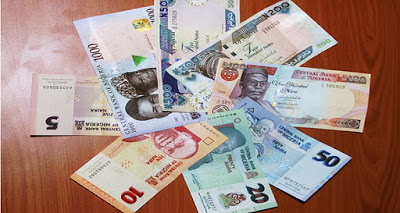The Central Bank of Nigeria (CBN) has
reported a drop by $247.7 million (from $6.2 billion in June to $5.88
billion in July 2018) the currency in circulation.
reported a drop by $247.7 million (from $6.2 billion in June to $5.88
billion in July 2018) the currency in circulation.
Statistics released by CBN reveal that the figure rose from $6.3 billion in February to $6.54 billion in March.
The CBN revealed that the currency in circulation fell to $6.4 billion in April and $6.31 billion in May.
The Chief Executive Officer, Economic
Associates of CBN, Dr Ayo Teriba, attributed the reason to the growth of
electronic payment, such as increase in the use of Automated Teller
Machines (ATM), Point of Sale (POS) and domestic
fund transfer rather than using cash.
Associates of CBN, Dr Ayo Teriba, attributed the reason to the growth of
electronic payment, such as increase in the use of Automated Teller
Machines (ATM), Point of Sale (POS) and domestic
fund transfer rather than using cash.
“The e-money is displacing the naira on
the retail fund as a means of payment, as a store of value, foreign
currency is replacing the naira.
the retail fund as a means of payment, as a store of value, foreign
currency is replacing the naira.
“So that trend may continue until you have a negligible amount of naira in circulation,” he said.
People, he explained, were no longer
needed to stuck up cash to pay for things, because they could go to the
supermarket, restaurant or any shop and pay with their bank card.
needed to stuck up cash to pay for things, because they could go to the
supermarket, restaurant or any shop and pay with their bank card.
“Instead of giving people cash, you can
transfer, so many of the things that you needed to use cash for in the
past you don’t need currency for them now. Electronic money is
displacing cash at the retail end.”
transfer, so many of the things that you needed to use cash for in the
past you don’t need currency for them now. Electronic money is
displacing cash at the retail end.”
“Another reason he gave is the weakness
of the currency structure, with the country having its highest
denomination as N1,000, a value that is less than three dollars.’’
of the currency structure, with the country having its highest
denomination as N1,000, a value that is less than three dollars.’’
He explained that it meant that the naira had been reduced from a strong means of payment that also possess store of value.
“It is a large denomination note that we
keep as store of value, so the naira currency is not a note that you
will say you want to keep as a store of value. If you want a currency
for value, you better move for foreign currency.
If you wanted money to keep at home for safe, you better keep your $50
or $100, or £20 and £50. So, naira as a store of wealth is weakened by
not having large denomination notes.”
keep as store of value, so the naira currency is not a note that you
will say you want to keep as a store of value. If you want a currency
for value, you better move for foreign currency.
If you wanted money to keep at home for safe, you better keep your $50
or $100, or £20 and £50. So, naira as a store of wealth is weakened by
not having large denomination notes.”
According to him, if a person holds the naira now, he probably wants to use it for retail spending.
He said that the naira now has competitors at the retail end such as the ATM and PoS.
“With fund transfer, You can transfer as
little as N1,000. You do not even need cash to buy recharge card because
you can recharge on your phone or at the ATM,” he said.
little as N1,000. You do not even need cash to buy recharge card because
you can recharge on your phone or at the ATM,” he said.





